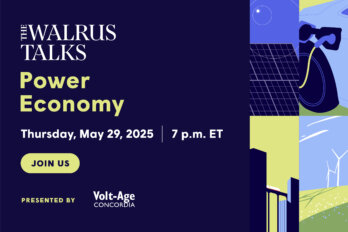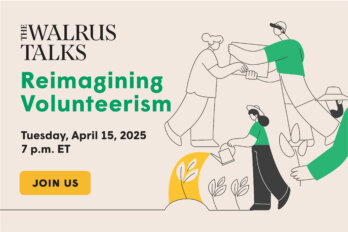Samra Habib is a writer, photographer, and activist and spoke at CIFAR presents The Walrus Talks Boundaries in Gatineau on Sept. 23, 2019.
You can watch all The Walrus Talks speakers from this event here: The Walrus Talks Boundaries on YouTube
Hi everyone, my name is Samra Habib. In my first year of school in Lahar, Pakistan, I met Khola, a cool kid with the fluffiest of curls that would reveal tiny flecks of gold in the afternoon sunlight. We were both about six years old.
Prior to starting school that year, my parents would give us regular lessons on hiding our religious identity. You see, we’re Ahmadis, a religious minority sect, regularly persecuted in Pakistan by Muslim extremists. Ahmadis are regularly punished legally and through extreme measures for anything from using a traditional Muslim greeting in public to reciting the call to prayer. In fact, we’re even forbidden from calling ourselves Muslim. One afternoon, as I made my way through the crowd at the Ahmadi mosque during Friday sermon, I noticed a girl with dark brown curls peeking out from tightly wrapped white headscarf. My heart stopped. It was Khola from my class.
She must have felt my gaze on her because she turned around and smiled. She made her way toward me and we hugged, and we shared our surprise of seeing each other at the mosque. Soon the Adhan, the call to prayer, came on signaling that the prayer was about to start, and I returned to my mom’s side. I felt relieved and energized by the discovery that I wasn’t alone in the secret. Someone I saw every day at school had to hide who she was as well. The next day in class I eagerly greeted Khola and told her how nice it was to see her at the mosque. “What are you talking about?” she replied. That wasn’t me. Clearly she had remembered her parents’ advice, unlike me.
As you can tell, from a very early age, I felt like there was no place for me in Islam, even though it was such a crucial part of my upbringing, and it informed how I saw the world. What made things a bit more challenging was the fact that I’m also queer. And queer Muslims aren’t always accepted by mainstream mosques. Once again, I felt like an outsider, like I had no right to call myself Muslim. “Were there others like me who felt the same way?” I wondered. To find out, I launch a photography project called Just Me and Allah.
I traveled around the world to find out what different queer Muslims relationship with Islam was. I photographed and interviewed people are from Istanbul to Brooklyn, and learned that Islam is not a monolithic religion. Muslims relationship with Islam is shaped by geography, class, race, gender. All of my subjects were questioning what it meant to be Muslim in the 21st century. Who decides who gets to call themselves Muslim? Doesn’t matter. No, was a consensus. In a way, the experience helped me reimagine my idea of home and community. I learned that my community isn’t necessarily limited by geographical boundaries. It’s knitted together by the belief that we’re allowed to hold onto our Muslim faith and proudly call ourselves Muslim even if we are rejected by so many.
Recently my younger brother, Bilal, asked me, “Why do you need to call yourself Muslim?” Maybe it’s our age difference, but we’ve never really discussed his relationship with Islam at any great length. I thought about his question, “Why do I feel loyalty toward Islam when, as Bilaal sees it, Islam is always kind towards queer Muslims like me.” The reality is that this identity has shaped the way I see the world and the way others see me in a way that is beyond my control.
Being Muslim is one of the only absolutes about myself I can be sure of. It serves as an anchor when I’m lost at sea. It helps me come back to myself, and it leads me to others who have struggled to reconcile seemingly disparate parts of themselves. For me, it’s not something I can just put on and take off like a garment. There’s no denying that my identity as a queer Muslim is the lens through which I see and engage with so many aspects of my daily life. Not everyone is equipped for activism in the traditional sense, marching, writing letters to officials. But dedicating your life to understanding yourself can be its own form of protest, especially when the world tells you that you don’t exist.
Throughout my childhood, I faced the very real fear that revealing my identity would put me in great danger. Once I started figuring out the many factors that define me, I was able to offer insight from the point of view I had searched for my entire life. I began to look outside myself. I understood my place in the world. And now I wanted to help others do the same. Maybe this identity, this label that defines me, is my house, and my voice was in here all along. What luck to have this house with a solid foundation, this home that supports me as I redefine my perspective over and over and over again. Thank you.




